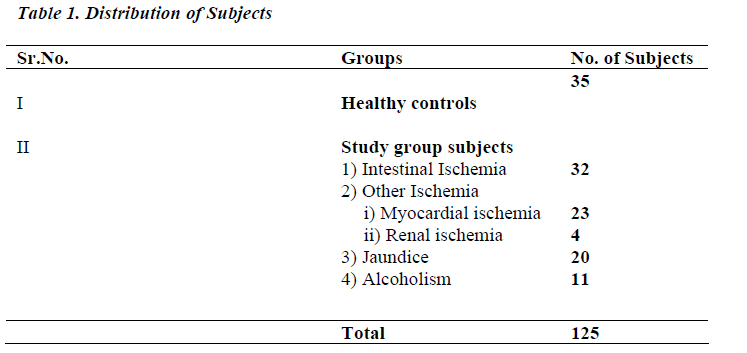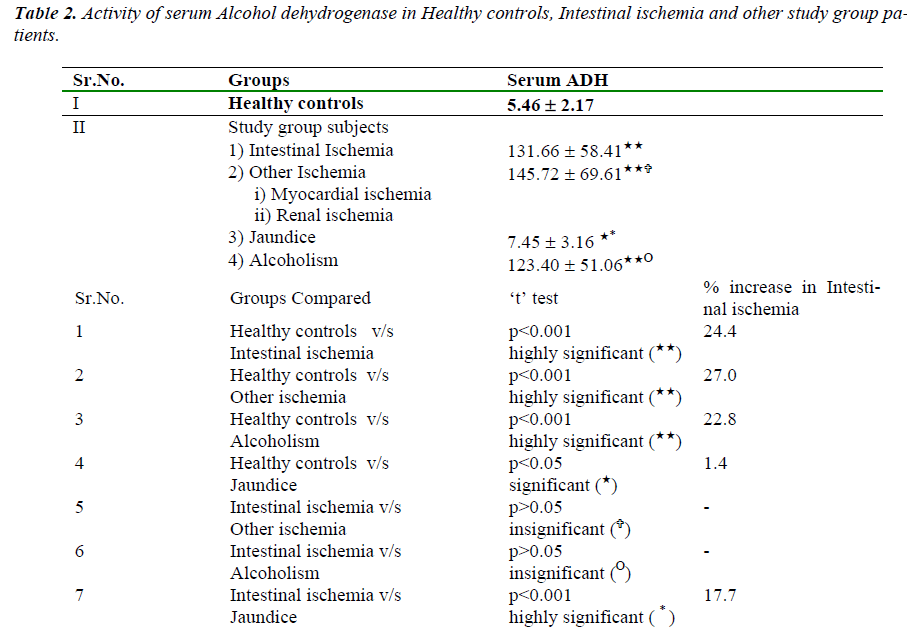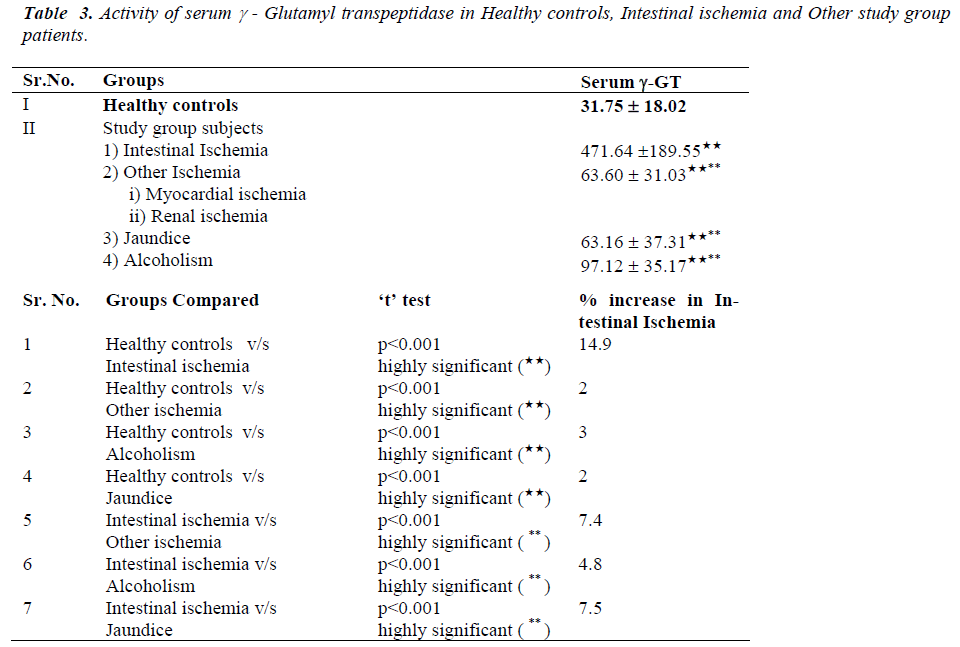- Biomedical Research (2011) Volume 22, Issue 4
Study of Certain Biochemical Parameters as Markers in Intestinal Ischemia
K.P.Gaddam1*, A. K. Shaikh1,N.G.Joshi2, A. N. Suryakar2, R. V. Katkam2
1Department of Biochemistry K. B. N. Institute of Medical Sciences, Gulbarga.
2Department of Biochemistry Dr. V.M Govt .Medical College, Solapur.
- *Corresponding Author:
- Kaushiki,P.Gaddam.
Department of Biochemistry
K. B. N. Institute of Medical Sciences
Gulbarga, Karnataka
India.
Accepted date: June 07 2011
Abstract
The present study was undertaken to find out the biochemical marker for diagnosis of Intes-tinal ischemia. Thirty five subjects were taken as Healthy controls, Ninety patients were di-vided into four study group’s viz-Intestinal ischemia, other ischemia’s, Jaundice and Alco-holism. Presently, the diagnostic techniques are expensive, less specific and sensitive and most of them are invasive. Hence, there is requirement of some specific, sensitive and non-invasive technique for diagnosis of Intestinal ischemia. The aim of the present study was to find out better biochemical marker for diagnosis of Intestinal ischemia. Previous all studies about Alcohol Dehydrogenase were done on animals, studies about Alcohol Dehydrogenase in Intestinal ischemia in humans are still lacking. Hence this study was undertaken to find out the use of Alcohol Dehydrogenase and γ - glutamyl transpeptidase to assess the utility in diagnosis of Intestinal ischemia. The present Study revealed highly significant increased ac-tivities of Alcohol Dehydrogenase in Intestinal ischemia, other ischemia and Alcoholism when compared with Healthy controls whereas insignificant rise in Alcoholism and Other ischemia when compared with Intestinal ischemia. γ - Glutamyl transpeptidase activities are significantly increased in Intestinal ischemia, other ischemia, Jaundice and Alcoholism when compared with Healthy controls. In conclusion it is evident from our observations, that γ - Glutamyl transpeptidase is a sensitive and specific marker for diagnosis of Intestinal ische-mia.
Key Words
Alcohol dehydrogenase, γ - Glutamyl transpeptidase, Cytosolic beta- glucosidase,
Introduction
Intestinal Ischemia can be a devastating disease. Current management of Intestinal Ischemia has evolved from simply managing the grave consequences to more aggressive and proactive methods aimed towards recognizing and exploring early warning signs and preventing catastrophic complications. Most of the tissues can develop ischemia due to reduced blood flow which causes hypoxia. However, the most important are Heart, Brain and Gastrointestinal tract. The incidences of ischemia of these tissues is high.
Intestinal ischemia includes:
1. Acute mesenteric ischemia.
2) Chronic mesenteric ischemia.
3) Focal intestinal ischemia.
4) Colonic ischemia [1]. All these types are associated with some common symptoms like, nausea, vomiting, transient diarrhea and bloody stools.
Intestinal ischemia may result from either arterial occlusive and vasospastic disease or from veno - occlusive disease. The most common form of intestinal ischemia is acute arterial ischemia. The risk factors for this type of ischemia are- Atrial fibrillation, recent myocardial infarction, valvular heart disease, Recent cardiac or vascular catheterization.
The increased incidence of intestinal ischemia seen among western countries parallels atherosclerosis and the aging population.[2] Intestinal ischemia is the term used to describe the result of a variety of disorders causing insufficient blood flow to the gastrointestinal tract [3]. Prolonged ischemia can lead to death of intestinal tissue .This condition is now called as Intestinal infarction .Consequences of late diagnosis is a multisystem organ dysfunction syndrome , which may lead to death. The mortality rate due to intestinal ischemia ranges between 60-100%.Yet there is no non-invasive method to diagnose intestinal ischemia in the early stage. There are several attempts to analyze a biochemical marker for the diagnosis of intestinal ischemia , however no suitable marker has been identified till date [4]. The measurement of plasma lactic acid , amylin level, serum concentration of cytosolic betaglucosidase and diamine oxidase and human intestinal fatty acid binding protein may serve as a diagnostic marker for early intestinal mucosal damage [5-11].
However all these studies suggest that these marker either lack specificity or sensitivity or both. In addition to above mentioned biochemical markers, some other diagnostic tools are also available. These tools include ECG, abdominal radiographs, Computed tomography and Mesenteric angiography. The “ gold standard “ for the diagnosis and management of acute arterial occlusive disease is laparotomy and for mesenteric arterial occlusion is mesenteric angiography.[2].
If treatment is initiated before infarction occurs mortality is low otherwise it approaches to 70-90%.Thus for better prognosis ,early diagnosis of intestinal ischemia is very essential.[3)]. Presently ,the diagnostic techniques are either too expensive ,or have less specificity or sensitivity and almost all of them are invasive. Hence, there is requirement of some specific, sensitive, fairly cheap and noninvasive technique for diagnosis of intestinal ischemia .In this regard, the present study was designed to find out whether alcohol dehydrogenase or γ -Glutamyl transpeptidase may serve better biochemical marker for diagnosis of intestinal ischemia.
Alcohol dehydrogenase is a major enzyme catalyzing the biological oxidation of ethanol in mammals [12]. The researchers found that alcoholism causes liver damage ,and in alcoholics the main source of serum ADH is gastrointestinal tract and not liver [13].
The membrane bound γ -Glutamyl transpeptidase catalyzes the first step in the extracellular breakdown of glutathione into its constituent amino acids, which can then be transported into the cell and used to maintain the level of intracellular glutathione. γ -Glutamyl transpeptidase is abundant in tissues with a secretory or absorptive function , such as kidney and pancreas.[15].
As Intestinal ischemia can be fetal if not treated early, reliable diagnosis of this is very important in saving the precious human life. Lot of research is done in diagnosis of Cerebral ischemia , Myocardial ischemia, whereas diagnostic marker for Intestinal ischemia remains to be studied. Hence, we planned to estimate the activities of Alcohol dehydrogenase and γ - Glutamyl transpeptidase in serum of patients suffering from intestinal ischemias, other ischemias like - Renal Ischemia, Cerebral Ischemia & Myocardial ischemia and in Jaundice and Alcoholism etc to assess their specificity in diagnosis of Intestinal ischemia.
Material and Methods
The present study was carried out in Department of Biochemistry K. B. N. Institute of Medical Sciences, Gulbarga. and Dr.V.M.Govt.Medical College and Shri Chhatrapati Shivaji Maharaj General Hospital,Solapur
Selection of Control group : For the comparison purpose , 35 normal non-ischemia healthy persons were carefully selected in accordance with age and sex who were physically active and not taking supplementation eg - minerals ,vitamins .
Patient’s selection : After consulting the Surgeons ,the patient’s blood samples were collected from the hospital attached to this institute and some other hospitals in the city .Total 32 blood samples of Intestinal ischemia were collected from Surgery ward .Similarly 27 samples of Other ischemia i.e.23 samples of Myocardial ischemia and 4 samples of Renal ischemia and 20 samples of Jaundice and 11 samples of Alcoholic patients were taken from the medicine ward of the hospital attached to this institute and some other hospitals in the city.
Collection of Blood samples: Before giving any kind of therapy the blood samples were collected. Total 5ml of venous blood was collected antiseptically in a sterile plain bulb and allowed to clot. Then serum was separated and stored in deep freeze and following parameters were estimated. γ-Glutamyl transpeptidase (γ-GT) was estimated by Szasz method [17,18.19] (Kit method).
γ - Glutamyl transpeptidase catalyzes reaction between GLUPA - C + Glycylglycine to form L- γ - Glutamyl Glycylglycine + 5 - Amino2- nitrobenzoic acid. [17,18.19]
GLUPA - C + Glycylglycine
L- γ- Glutamyl Glycylglycine +5-Amino 2-nitrobenzoic acid.
GLUPA - C : L - Gamma - Glutamyl -3- Carboxy-pnitroanilide
The activity was measured by following formation of 5-Amino 2-nitrobenzoic acid at 405 nm in kinetic mode. The γ - Glutamyl Transpeptidase activity was calculated by using the following formula :
γ - Glutamyl Transpeptidase activity = ((Δ OD/min) x 1158.
ADH
CH3CH2OH + NAD+ 3CHO+NADH +H+
(ETHANOL) (ACETALDEHYDE)
The NAD+ used in the reaction was measured at 340 nm. The activity was measured from the absorptivity of NAD+ at 340 nm i.e. 6.22 x 103 L.mol-1.cm-1
Alcohol dehydrogenase (ADH) was estimated by the method described by Kato et al. [20].
Alcohol dehydrogenase catalyzes following reaction.
Results and Discussion
The studies carried out by various scientists about Intesti-nal ischemia in experimental animals showed that the rise in ADH level probably suggests that It leaks out from gastrointestinal lumen into the blood compartment due to an intestinal barrier dysfunction caused by intestinal ischemia [4].
The activity of Alcohol dehydrogenase in serum is found to be increased in Intestinal ischemia, Renal and Myocardial ischemia and Alcoholism. In fact the activity of this enzyme is more in other ischemias as compared to Intestinal ischemia. This shows that Alcohol dehydrogenase is not a sensitive or specific marker for diagnosis of Intestinal ischemia. Though it was not the aim of this study, the findings in this study about ADH do not agree with the findings of earlier studies. Thus, the present findings force to conclude that GI tract may not be the source- at least an important source of ADH. γ- Glutamyl transpeptidase is involved in Glutathione metabolism and transport of amino acids across membranes. Therefore, it is present in high amounts in those tissues which are involved in transport of amino acids. GI tract is one of them. Since GI tract is involved in absorption of large amount of amino acids resulting from digestion of dietary proteins, the activity of γ- Glutamyl transpeptidase in enterocytes is usually very high. When enterocytes are damaged, as in ischemia, the membrane permeability changes. This leads to leakage of large molecules like γ- Glutamyl transpeptidase into circulation [15,16].
The activity of γ- Glutamyl transpeptidase is found to be increased in all experimental groups as compared to Healthy controls. However, as the table no.3 shows the activity of γ- Glutamyl transpeptidase is almost 7.4 and 7.5 times more in Intestinal ischemia as compared to oth-er ischemias and Jaundice; and 4.8 times increased as compared to Alcoholism. The higher activity of γ- Glutamyl transpeptidase in the range of 471.64 + 189.55 U/L is so high as compared to other experimental groups that it can be safely concluded that γ- Glutamyl transpeptidase can be sensitive and specific marker of Intestinal ischemia.
Conclusion
• As Alcohol dehydrogenase activity is increased in all experimental groups except Jaundice, it is concluded that Alcohol dehydrogenase is not good diagnostic marker for Intestinal ischemia. It also seems that the GI tract may not be the major source of ADH in serum.
•γ-Glutamyl transpeptidase is also increased in all eexperimentalgroups a scompared to control. However, the degree of rise in Intestinal ischemia is unparallel if the levels in other experimental groups are comparedlevels in other experimental groups are compared.
• Thus γ-Glutamyl transpeptidase can be considered as marker for diagnosis of Intestinal ischemia. However, this needs further study involving many other pathological conditions. This study seems to be the first and the only study to show the use of γ-Glutamyl transpeptidase as a marker of Intestinal ischemia
References
- Schwartz SI, EllisH. Maingot’s Abdominal Operations. 1989;1: 397-418.
- Kasper, Braunwald, Fauci et al. Principles of internal medicine. 2005; I: 1795-1803.
- Rosenthal LS and Brandt LJ. Intestinal ischemia..American college of Gastroenterology. 2002: 1-8.
- Gumaste UR, Joshi MM, Mourya DT et al. Alcohol dehydrogenase : a potential new marker for diagnosis of intestinal ischemia using rat as a model.World J Gastroenterol, 2005; 11 (6): 912-916.
- Sommer T, Larsen JF. Detection of intestinal ischemia using a microdialysis technique in an animal model. World J Surg 2003; 27 : 416-420.
- Tenhunen JJ, Jakob SM, Jakala JA,Gut luminal lactate release during gradual intestinal ischemia. Intestive Care Med 2001; 27: 1916-1922.
- Dimmitt RA, Glew R, Colby C etal. Serum cytosolic beta- glucosidase activity in a rat model of necrotizing enterocolitis. Pediatr Res 2003; 54: 462-465.
- Phillips AR, Abu-Zidan FM, Farrant GJ etal. Plasma amylin concentration is related to the severity of intestinal ischemic injury in rats. Surg. 2001; 129:730-735.
- Bragg LE, Thompson JS, West WW. Intestinal diamine oxidase levels reflect ischemic injury. J Surg Res. 1991; 50: 228-233.
- Lieberman JM, Sacchellini J, Marks C et al. Human intestinal fatty acid binding protein : Report of an assay with studies in normal volunteers and intestinal ischemia. Surg 1997; 121: 335-342.
- Kanda T, Fujii H, Tani T et al. Intestinal fatty acidbinding is a useful diagnostic marker for mesenteric infarction in humans. Gastroenterology 1996; 110: 339-343.
- Moreno A, Pares X. Purification and characterization of a new alcohol dehydrogenase from human stomach. J Biol Chem 199; 266: 1128-1133.
- Chrostek L, Szmitkowski M, Wierzchowski J. Activity of class I and II alcohol dehydrogenase in the sera of alcoholics. Eur J Clin Chem Clin Biochem 1994; 32 : 881-884.
- Potdar PD, Andrews KL, Paul N et al. Expression and regulation of γ-Glutamyl transpeptidase related enzyme in tracheal cells. Am J Physiol Lung Cell Mol Physiol. 1997; 273: 1082-1089.
- Filez I, Stalmans W, Penninckx F, et al. Influences of ischemia and reperfusion on the feline small intestinal mucosa J Surg Res.1990; 49: 157-163.
- Park P.O, .Haglund U ,BulkleyG B etal .The sequence of development of intestinal tissue injury after strangu-lation ischemia and reperfusion Surg. 1990; 107: 574-580.
- Szasz. Gamma GT G .Clin Chem1976; 22: 2051.
- Tietz NW. Textbook of Clin.Chem 1986; 678-686.
- Kato S, Ishii H, Kano S et al. Improved assay for alcohol dehydrogenase activity in serum by centrifugal analysis. Clin. Chem 1984; 30: 1817-1820.


